Last bus out: How one family's trip on a migrant bus delivered a dream
This story is a collaboration between the El Paso Times and USA TODAY for the fifth episode in the series “States of America.” The full episode of “States of America” exploring the migration crisis will premiere at 8 p.m. MST and 10 p.m. EST on November 25 on USA TODAY NETWORK’s streaming channel. For a full list of platforms offering our FREE streaming channel, follow the link here and catch our full series on YouTube here.
In some ways it was like any cross-country bus ride: too cold, then too hot, the children hungry and tired, every stop too much like the one before.
A fluorescent halo glowed over gas pumps and inside the brightly lit convenience stores in Texas, then Tennessee, Virginia and Pennsylvania, overpriced merchandise sharing aisle space in a way that wouldn’t happen anywhere else.
Kristian González Pérez zoomed his camcorder on hot dogs on a warmer; electronic tablets in a glass case; bananas in a basket for $1.29 each.
The 33-year-old Venezuelan, his wife Katiuska Carolina Leal Moreno and their two young children were on one of the last migrant buses out of El Paso.
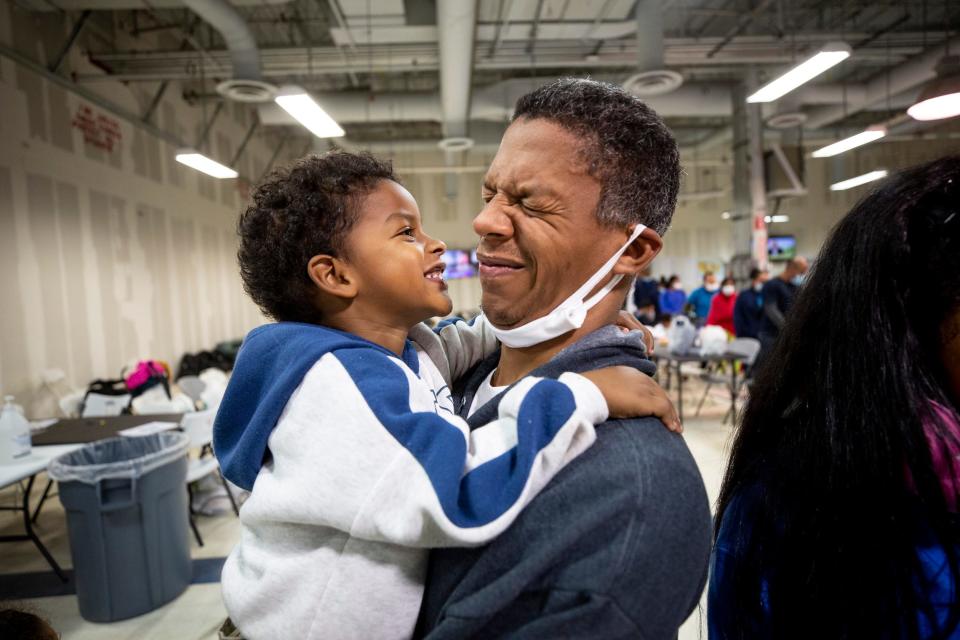
They were four of 10,713 asylum seekers who took the same route to New York on city-chartered buses. The family captured the journey on cameras provided by the El Paso Times and the USA Today Network.
Hours earlier on Oct. 19, exactly 35 days after they left Venezuela, González Pérez and his family had lined up in the parking lot of El Paso's Migrant Welcome Center. They smiled into the cellphone camera as the bus idled beside them.
The family was among the last of the Venezuelan asylum seekers to be granted entrance and a ticket to their destination before Border Patrol began returning Venezuelan migrants to Mexico. El Paso would soon shutter its welcome center and stop the buses.
Leal Moreno, 26, had only ever seen Times Square in the movies. She imagined if she ever found herself there, she might glimpse King Kong — a joke, but so was the idea that she would ever see New York City.
“We’re boarding the bus for New York,” Leal Moreno said to the camera, pulling her daughter, 5-year-old Brittany, close. “Look, smile! Are you happy?” Sí, her daughter said. Their son, 3-year-old Moises, cried out in his father's arms.
A city worker walked up and down the aisles of the bus as everyone got situated and offered a farewell.
Desde mi corazón, she said, "From the bottom of my heart, I want to wish you all the best: that your dreams come true and that you succeed here in the United States. God bless you and good luck!"
The passengers chorused with gracias and amen.
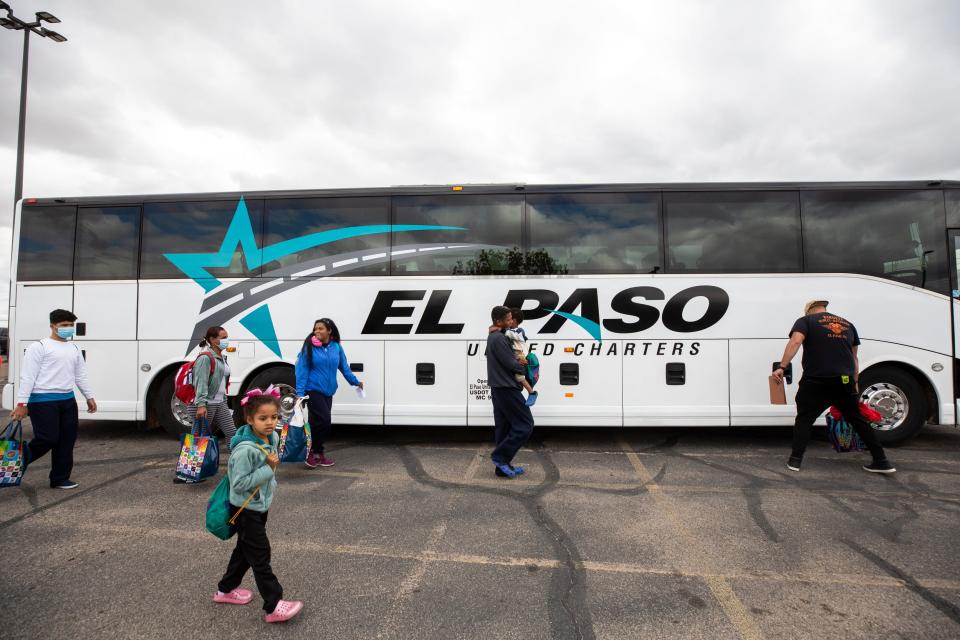
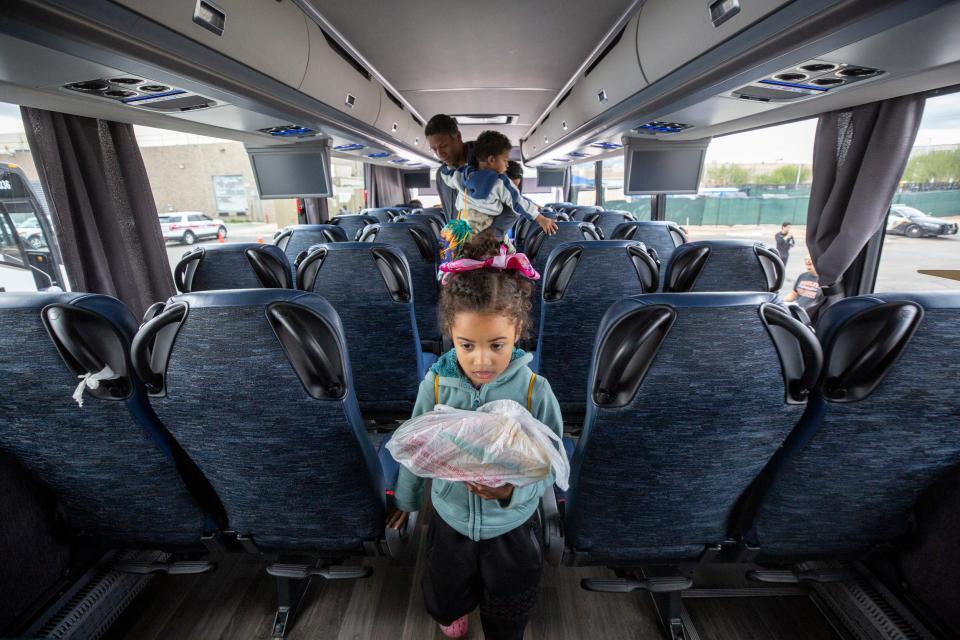
The bus rolled out at 3 p.m. under a cloudy sky. The children waved goodbye to the city workers and Leal Moreno said a prayer as bachata music played. She wore a cushion around her neck like a seasoned traveler ready for a smoother trip.
It was a turning point in their lives and for the El Paso border amid a humanitarian crisis.
Between them and their hoped-for destination lay another 2,200 miles.
Migrants share tales of their journey through the Americas, of bandits and a massacre
The blue curtains on the bus windows framed American highways.
González Pérez trained his camera on children sleeping in their parents' laps, on the flat plains blurring by. The hours passed, and the migrants began trading stories.
A woman from Peru, two women from Colombia and a man from Nicaragua leaned in. González Pérez spun tales from the road, of escaping criminals, of good Samaritans who helped them along the way, of a narrow miss when his family passed a point in the Darién jungle, the notoriously dangerous isthmus dividing Colombia and Panama, where two hours before bandits had allegedly slaughtered a family of migrants and their children.
A 30-year-old Colombian woman traveling with her husband and daughter said she flew straight to Mexico City.
“Oh you are so fortunate!” González Pérez said. “We had to pass through the Darién.”
“We were detained eight days,” the woman said.
“In the nevera?” he asked, referring to the air conditioned Border Patrol holding facilities many migrants from tropical climates called “freezers.” She nodded yes. He said his family was detained, too.
“They were going to release us right away," González Pérez said, "but my children got sick and they kept us for five days.”
The Colombian woman explained how she and her family took another plane to Juárez. She rubbed a rosary worn around her neck. She had family waiting for her in Miami, she said; the bus ticket from New York would be less expensive than from El Paso.
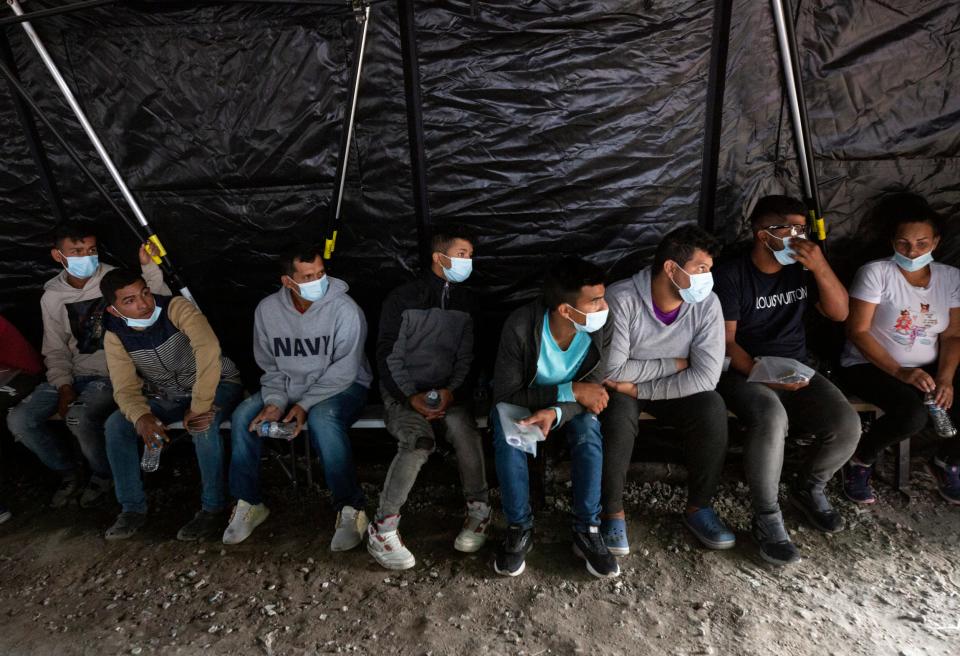
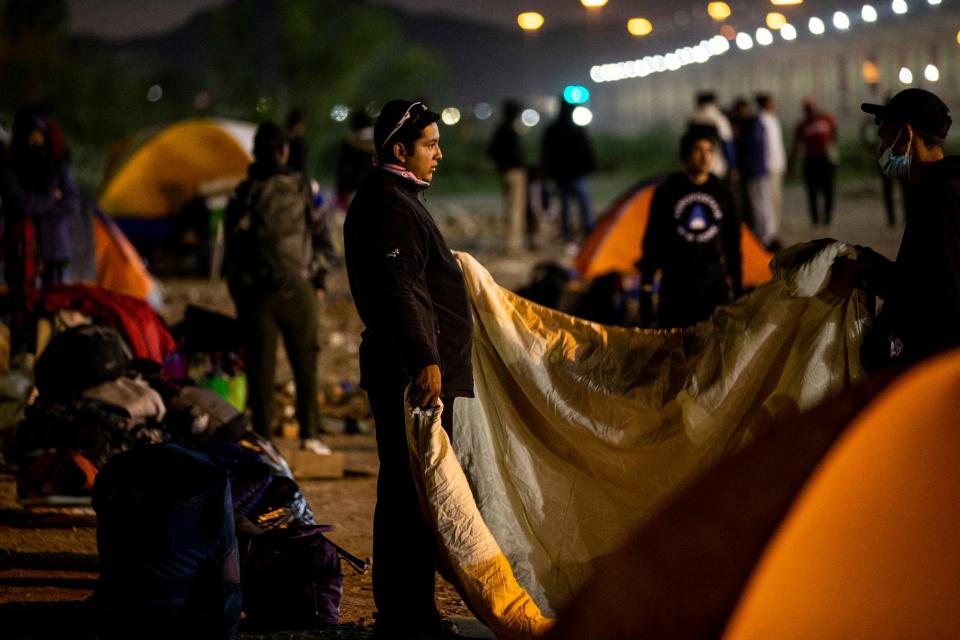
González Pérez told stories about the buses north through Mexico, how masked men boarded to rob everyone of 100 or 200 pesos each.
“Everyone has a different experience,” he said. “But look at us. We did it.”
González Pérez and his family had no one in the United States. They would try to make it in New York.
Every stop was the same gas station in a new city: a Love’s travel center branded red, yellow and orange.
On the second night, González Pérez padded into the convenience store searching for a cup of Maruchan instant soup. The store filled up with people speaking Spanish, many of them wearing Border Patrol-issue sweatpants and blue clogs or slip-on shoes.
“Everything here is expensive,” González Pérez worried out loud.
His wife grabbed a hot dog from the warmer.
“None for me?” he asked jokingly.
She teased him. “You were going to have soup, weren’t you?” They bought a couple of hard-boiled eggs for the kids. Money was extremely tight; amid the abundance of chips and candies, real food was scarce.
She flashed a tired smile at her husband as they headed back to the bus. He called her "Caro" for short. They didn't know where they were, but they were somewhere past halfway there.
However long this bus ride was, however hungry and exhausted they were, they both knew they had gotten the opportunity of a lifetime.
Crackdown on Venezuelan asylum seekers
It could have gone differently.
They crossed the Rio Grande on the night of Oct. 10 and turned themselves in to Border Patrol at a mobile processing site in south El Paso. A cellphone video shows them smiling under the Loop 375 overpass, Moises on his father's shoulders, Brittany on her mother's back.
"Llegamos," Leal Moreno says to the camera. "We made it."
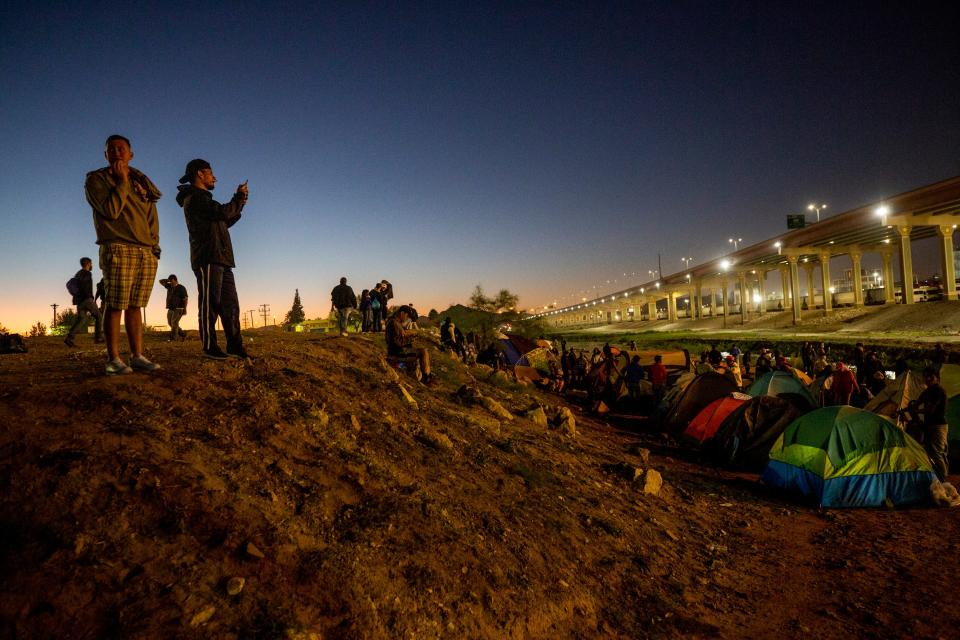
Two days later, the U.S. cracked down on what had become the largest exodus in the Western Hemisphere. The Biden administration struck a deal with the government of Andrés Manuel López Obrador to quickly expel Venezuelan asylum seekers to Mexico.
The family was in Border Patrol custody when the news hit, but they were released to the city's welcome center anyway. Between August and October, the city chartered 294 buses for nearly 14,000 migrants at a federally reimbursable cost of $8.9 million. The majority said they wanted to go to New York.
“Years ago in Venezuela, this is something that would have been impossible for me — impossible,” she said at the welcome center. “To come to the U.S. you had to have a visa and a lot, a lot, of money. When we heard about this chance, we saw it as an opportunity, not just for us but for our children.”
Thousands of other Venezuelan asylum seekers, including families, had been returned to Mexico. Hundreds were sleeping in an encampment on the Juárez side of the Rio Grande, the United States just out of reach.
"Can you imagine how the people feel who are left on the other side?" González Pérez said. "There are people who are left (in Mexico) with nothing to eat and no idea what’s going to happen to them. I am so grateful not to be in that position. I don’t even want to imagine it. Mexico isn’t easy."
'You are welcome in New York'
Dawn broke at the mouth of the Holland Tunnel in Jersey City, N.J. The bus crawled east in rush hour traffic.
In the light at the end of the tunnel, the Manhattan skyline soared.
González Pérez turned his camcorder on as the bus rumbled to a stop at New York's Port Authority bus terminal at 8 a.m. on Oct. 21 after roughly 40 hours on the road.
A man in a beanie and a black sweatshirt boarded and introduced himself as Power Malu, the son of Puerto Rican immigrants and a nonprofit volunteer there to welcome them.
For González Pérez and his family, El Paso was their modern-day Ellis Island. But they had arrived at the historical doorstep of the United States, where the Statue of Liberty was enshrined in poetry as the "Mother of Exiles" and millions had stepped into a new American life.
"If you hear people here saying you are coming to displace them or to take their jobs, don't listen," Malu said in Spanish. "If their people weren't born here 500 years ago, then they, too, are immigrants. So I want you all to know" — and then with special emphasis on every word — "you are welcome in New York!"
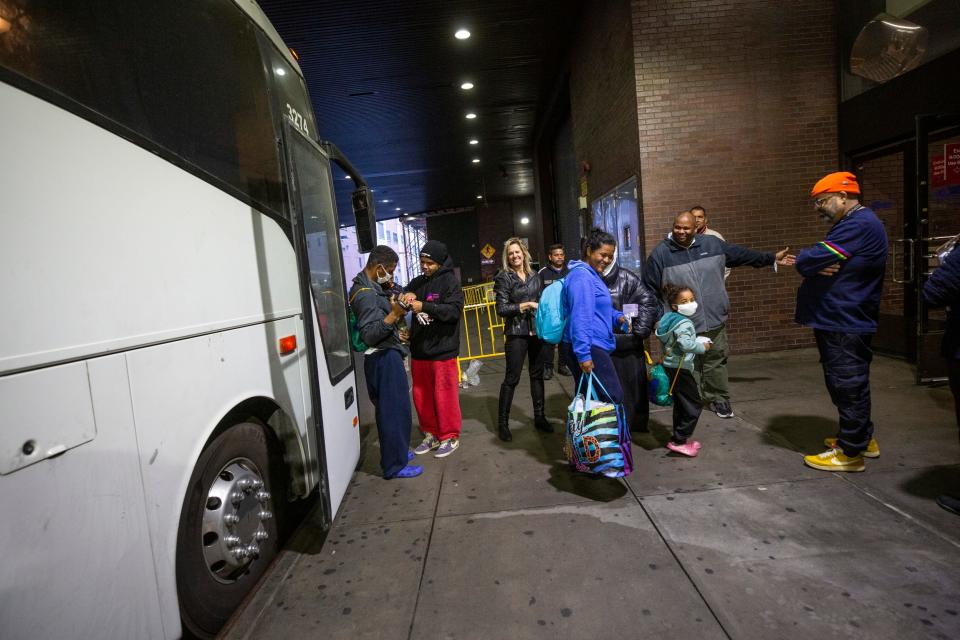
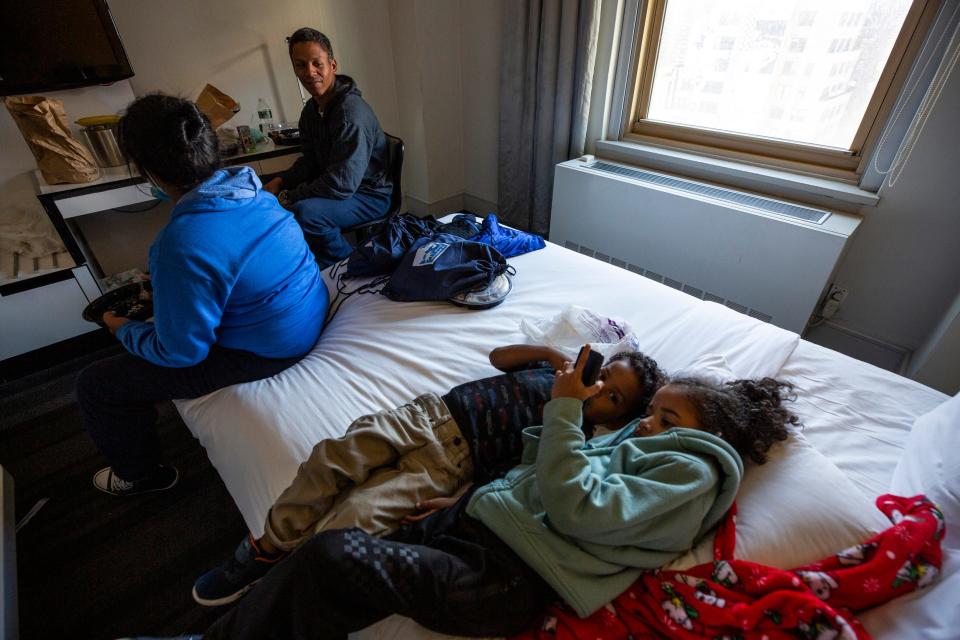
Everyone cheered and gathered their bags. As each passenger stepped out of the bus, Malu tore off the paper bracelet that tagged them as migrants.
Inside a cordoned-off area of the terminal, he and the other volunteers registered them by their names and assigned those without a sponsor to a homeless shelter, or to a rooms in one of more than 50 hotels chartered by the city.
"Migrants" are only migrants for a time. Before they fled Venezuela and lost hope their country could change, González Pérez and Leal Moreno were something else.
González Pérez went to college to become an industrial health inspector 15 years ago, when Venezuela was already deep into an economic crisis that would only get worse. He worked in fast food in Bolívar before he and Leal Moreno decided to try their luck in Peru. He got a job with a shrimping company, but pandemic and economic troubles wiped out whatever gains they hoped to make and they went home.
Leal Moreno worked as a stylist in her mother's hair salon. She was a young mother; she had Brittany when she was 20 and Moises two years later. Facebook pictures from her life in Venezuela show her dressed up, with straight black hair, winged eyeliner and red lipstick.
What would they become in this new city?
A future in New York filled 'with purpose and goals'
Leal Moreno sat on the bed of a small room on the 11th floor of The Row hotel, which the city of New York paid for as a temporary migrant shelter. The children sucked on juice box straws and played, while González Pérez finished his first meal in days of chicken, rice, plantains and habichuelas.
He could think only of finding work.
"When I get my first paycheck, then I’ll believe it’s real," he said. "It’s great seeing all the skyscrapers and everything. But when I earn my first paycheck, when I can help my family — my children, my wife, my mother and grandmother, my mother-in-law, cousins, brothers, my father — that’s when I know it was all worth it."
Leal Moreno considered what might come next for her.
"I’d like to leave the past behind," she said, "and become a new Carolina with purpose and goals."
"Amen," her husband said.
"That’s what I’d like," she said, nodding to her children, "to grow and provide new opportunities for them."
Their immediate responsibilities were serious: They would need to check in with U.S. Immigration and Customs Enforcement agents. They would need to apply for asylum and work authorization, an arduous process with no guarantee of success. They'd need to enroll Brittany in kindergarten and find an affordable place to live, as the hotel-shelter was available to them for three months, not more.
But they finally had a room of their own, and that was something to celebrate.
Father and son fell asleep in the middle of the afternoon. Leal Moreno didn't let them rest long.
New York City was outside their window. Times Square, the cinematic landmark she had imagined, was walking distance away. She couldn't wait to explore.
They bundled their children in donated clothes and took the elevator down. Outside the glass hotel doors, New Yorkers fast-walked by, car horns blared and street vendors hawked food and rapid COVID-19 tests — so much happening in the span of a city sidewalk.
They headed east along 45th Street, passing theaters and restaurants and weaving through the crowds until they reached the intersection where Broadway crosses 7th Avenue.
Times Square twinkled like a dream come true. Someone in an enormous King Kong costumed waved.
Lauren Villagran can be reached at lvillagran@elpasotimes.com, on Twitter @laurenvillagran and on Instagram @fronteravillagran.
This article originally appeared on USA TODAY: Inside a Venezuelan family's bus trip from El Paso to New York

